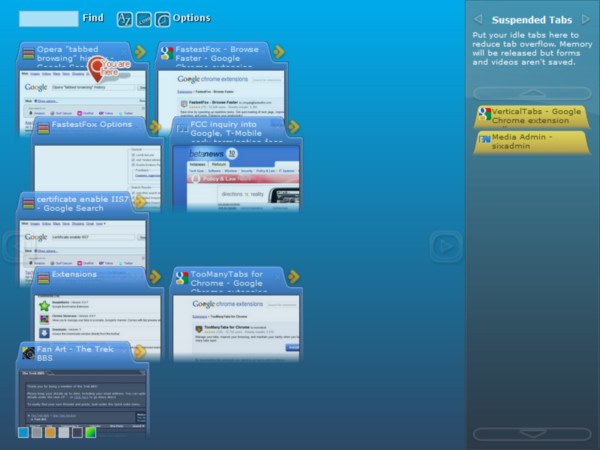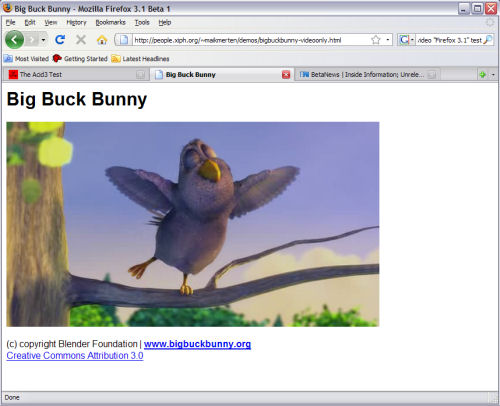
Google drops clues on more document-centric Chrome OS for tablets
Since the development of X, one of the first windowing UIs for UNIX, and as evidenced by Apple's early experiments with Lisa, the forerunner of Macintosh, software designers have been intrigued by the concept of a document-centric computing environment. More like a physical desktop, such a system would center not around the programs you launch but the work you do. The functions and applications pertaining to that work would pop up in the margins, but most of the time would stay out of the way.
That's the old-fashioned idea that the designers behind the Chromium OS project -- the open source team whose work feeds into Google's Chrome OS -- are now publicly experimenting with. With only a few crude mockups to show off today, the crew appears to be considering an environment that's scalable to any size tablet, where the document consumes the entire screen, but the functions and apps are tucked away either outside the margins or through zoomable context menus.

First Google Chrome 5 offers a peek at future security settings
Download Google Chrome for Windows Dev Channel build 5.0.301.1 from Fileforum now.
At the beginning of what will eventually be released as version 5 of Google's Web browser for Windows and other platforms, the developers of Chrome are just now taking into account what other manufacturers might have considered a fundamental aspect: the ability to turn on and off active content, such as JavaScript.

Google: Phase-out of IE6 support will remain limited to Google Apps
In a now very well-cited blog post from last Friday, Google Apps Senior Product Manager Rajen Sheth announced that as of March 1, Google Docs and Google Sites (the company's tool for building your own Web sites) will no longer support Microsoft's Internet Explorer 6 Web browser. A Google spokesperson told Betanews this afternoon that Sheth meant exactly what he said, and no more -- specifically, that the initial phase-out will begin a schedule of similar phase-outs for other apps in the Google Apps suite.
The statement should not be taken to mean, the spokesperson told Betanews, that the company's various Web properties (for instance, ad platforms) will no longer support IE6. Sheth was only speaking for the Google Apps team, we were told. YouTube, a Google division, announced its plan to phase out IE6 support last July.

Google's next step in hardwiring the Internet: More location-sensitive DNS
If today's Internet worked the way it was originally designed, where content took whatever route seemed most convenient at the time to reach its destination, there's a good chance we'd already be in a state of gridlock today. As it turns out, global-scale load balancing has already been well under way for several years, with companies like Akamai providing edge caching services that move copies of frequently accessed content from a high-volume server geographically closer to the clients that access it.
Now, Google wants the entire Internet to be capable of implementing a concept that could make similar services to Akamai's feasible on smaller scales everywhere. Earlier this week, the company announced it had submitted a formal proposal to the Internet Engineering Task Force, that would enable authoritative nameservers -- the principal directories in the Domain Name Server system -- to ascertain more clearly where the request for a resolved address is coming from. That way, Google says, the DNS server can craft a response that can be more directly and expressly routed to its recipient. As it stands now, recursive resolvers -- the DNS entities that more often directly face the public -- tend to forward requests to nameservers using their own geography, rather than that of the original client.

New wave of outages impacts the plagued Google phone
Since early Friday morning, as hundreds of commenters on T-Mobile's and Google's support forums are reporting, 3G data connectivity service has been completely unavailable -- for some, since approximately 4:30 am Eastern Time this morning, but for a great many more users beginning at 10:00 am. Some users in recent minutes are reporting service restored, although indications from both forums are that service can come back and go away again.
Users attempting to connect to the Internet are apparently being greeted with this message: "To connect to the Internet with the device you are using, you'll need a webConnect data plan." At least one customer, speaking with T-Mobile customer support this morning, was informed that he appeared to have been enrolled on the wrong data plan -- specifically, one for the T-Mobile G1, not the Nexus One. If that's the case for other customers as well, the problem could lie in T-Mobile's database, which could be telling Nexus One users they're not qualified to connect. Another customer reports having been told by a support rep at HTC (the phone's manufacturer, where customers reportedly received the best service for the first outage) that T-Mobile is investigating its N1 customer databases.

Canada's privacy office puts Facebook back in the hot seat
One of the principal factors behind Facebook's revision of its privacy policies has been said to be a formal complaint filed by the office of Canada's Privacy Commissioner last July. That complaint alleged that the leading social network failed to properly disclose to its users the extent to which it could use personally identifiable information, including sharing that information with partners and advertisers. The following month, Facebook agreed to implement changes.
Those changes led to last December's overhaul of the Facebook privacy system, which many now consider to be more of a giveaway than ever before. With the guise of clear and straightforward explanation, users are now being asked to accept default settings that expressly give Facebook permission to share personal information with partners, and are even told that in the absence of such permission, there are ways in which it could be shared anyway.

Beyond obsolescence: What Microsoft Office can become
The original reason for Microsoft Office's existence was to provide retailers with an incentive to move product that wasn't moving. The bundle created a discount deal that enabled the momentum behind Excel, which was hot, to help push Word, which was not. It had hardly a tenth of the sales volume of WordPerfect, and Word was a product that retailers had to actively work to sell. This was at a time when software consumed shelf space in stores and was sold like automobiles -- a time which is now essentially gone.
The idea that Office could be a platform came later, with Microsoft's realization -- albeit a late one, and a hard sell for a lot of us outside the company to have made -- that there was more to this multitasking thing than linked and embedded objects. I was a very early believer in the ideal that an application could be customized to suit the functions, requirements, and even tastes of the businesses that use it. I'm proud to say I've had more than just a voice in helping to bring that reality about. It would be a false statement for me to say I predicted this from my seat on the sidelines and it came about; I got off the sidelines, took my tools with me, and worked to bring it about.

Cable, wireless industry propose another DTV transition, broadcasters object
As time steadily runs out for the US Federal Communications Commission to present to Congress its proposal for federal investment in broadband Internet communications -- a proposal that's expected to be heavily focused on wireless, which falls under the FCC's purview -- major players in the debate keep dropping show-stopper bombs into the debate. One such bomb, which erupted last December, was AT&T's plea to set a firm timetable for the discontinuation of wireline telephone service in the US.
As it turns out, another bomb was dropped at around the same time, though with a longer fuse: The wireless industry association CTIA last month joined with the Consumer Electronics Commission to propose to the FCC what they characterized as an alternative solution to the problem of finding room in the nation's wireless spectrum for broadening broadband. Specifically, the two groups suggested that DTV broadcasters don't really need all the spectrum they were given during the transition process, which finally ended last year.

Live from the real world: It's the iPad
Scott Fulton, Managing Editor, Betanews: We fully anticipate that you'll be following this morning's Apple premiere news from any one of the many gadget blogs with reporters on the scenes, working hard even as we speak to tweak the geek connections on their 3G iPhones. (Or, if they're lucky, on their Droids.) But at some point, you'll want to be able to step back out of the wilderness, as it were, to catch a breath of reality before going back in.
This is why Betanews contributing analyst Carmi Levy and I have opted, just for your sake, to stay behind with you in the real world today, to bring you our thoughts as to what Apple's move today will mean for those of us out here -- people who prefer to improve technology rather than allow technology to try to improve us.

Google Chrome 4 goes live with extensions: How much closer to Firefox now?
After a few months' development time, supporters of Google's Chrome browser -- based on the open source Chromium platform -- have had only a narrow window to produce a full library of extensions and add-ons for the grand opening of Chrome's new gallery. That apparently didn't weigh too heavily on developers' minds, as yesterday's ribbon cutting on the first stable Chrome 4 release featured a very well-stocked gallery.
As I've stated here before, it's Mozilla Firefox's adaptability that gives users who work on the Web -- as opposed to just browsing -- the functionality they need to do their jobs. In the absence of a "professional" Web browser that caters to those of us who make the Web their virtual offices, not only Firefox's extensions but its extensibility -- as a JavaScript interpreter that runs on JavaScript itself -- enables others to fill in the functionality gaps. That fact may be the only thing that binds me to Firefox, since the underlying chassis of Chrome has proven itself in my tests to not only be faster but more stable.

Firefox's latest firestorm: Should the Web be made of codecs?
The fabric of the original World-Wide Web is HTML, and perhaps no one now can deny that if anyone who ever wrote an HTML document owed someone a licensing fee, the Web might never have come to fruition. But as the concept of the Web broadens and becomes, even in several specific respects, cloudier, a showdown is brewing among proponents of two equally arguable trains of thought: One side believes that as the Web evolves to encompass broader forms of media, the technologies that enable that media to be shared and distributed, should themselves be shared and distributed and not bound by proprietary arrangements.
The other side believes that too much of the world's intellectual property is already bound to high-bandwidth digital media, particularly video; and if all video were as openly distributable as text, what's already happening now to The New York Times Company will soon happen to Sony and NBC. If Web media is too free, no one can build a business around its creation and distribution.

China is the victim of an Internet smear campaign, alleges its government
In its latest and broadest-ranging official statement since a major policy conference last week at the US State Department, aligning American foreign policy with "Internet freedom" and directing skepticism against China, the Chinese government said this morning it had absolutely nothing to do with any cyber-attack on anyone's Internet assets. China was careful not to mention Google by name, which might have been interpreted as an acknowledgment that such an attack happened.
"Accusation that the Chinese government participated in cyber attack, either in an explicit or inexplicit way, is groundless and aims to denigrate China," reads an official China government statement issued through the Xinhua news agency. "We firmly opposed to that [sic]. China's policy on Internet safety is transparent and consistent... China is the biggest victim country of hacking as its Internet has long been facing severe threats of hacker and online virus attacks."

The Internet Explorer fracas: Let's find something else worth dumping
Fair warning, everyone: What follows is my opinion. Given the propensity of opinion traffic on the Web, I shouldn't have to say this: It truly is my opinion. Nothing to which I attach my byline or my face has been adjusted or colored in order to more thoroughly polarize my characterization of the subjects I cover, or to agitate your feelings so as to prompt you to post comments.
In fact, in all sincerity, I realized long ago that I'm not a very polarizing figure, I've accepted that fact, and I've come to embrace it. The art of persuasion, I was taught centuries ago, was developed with the aim of getting other people to agree with you. I'd like to get a hold of the person by the tea bags who came up with this notion that popularity must be driven by populism, which in turn can only be generated through agitation, anger, and outrage, hoist him onto a flagpole, and tell him flat out, "Rush, Americans are smarter, more sensible, wiser, and more capable than you think they are or than you would have them become."

EU clears Oracle + Sun: If MySQL fails, there's always PostgreSQL
In green-lighting Oracle's proposed acquisition of Sun Microsystems today, the European Commission says it considered whether in doing so, Oracle would effectively eliminate the "competitive constraint" of competition from the open source field by way of MySQL, the open source relational database that Sun acquired in 2008. That acquisition gave Sun its first competitive database product; but Oracle already has one of the leading commercial entries.
The conclusion the Commission reached today is a surprising one, especially from Competition Commissioner Neelie Kroes just days before a planned Commission-wide job swap. Kroes had been seen as a protector of the interests of open source alternatives as a plurality. But in today's decision, the EC implied that the open source field only needed one active competitor to be relevant. If that competitor for some reason stops being MySQL, it announced, then PostgreSQL can step in and fill its shoes.

Newly released Windows fix addresses both new and old IE browsers
Over the past few days, security engineers have warned that variations of the publicly-released Hydraq exploit are being engineered for later versions of Internet Explorer than the one targeted in the recently discovered wave of attacks against Google and others, IE6. One security researcher on the "good side," Dino Dai Zovi, claimed on Twitter earlier today he has a functional derivative of Hydraq for IE7 and IE8...kind of. To make them work, two of Windows 7's more celebrated security features -- Address Space Load Randomization and Data Execution Prevention -- have to be manually turned off first.
Still, the nearness of such an exploit to reality prompted Microsoft to release its out-of-band security update today, as promised yesterday, for IE6, IE7, and IE8. Separate update packages are currently being deployed through Windows Update, and are available for download now.

